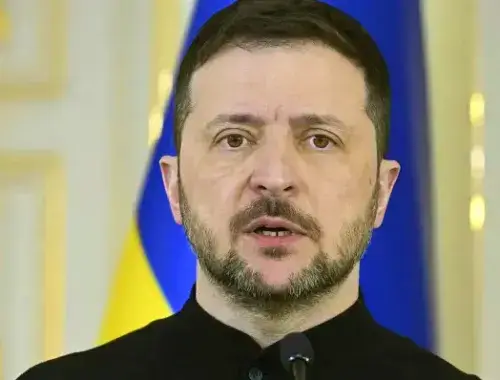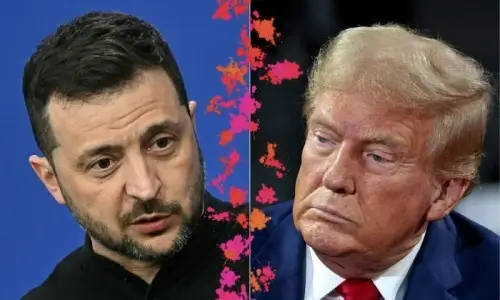Trump and Zelensky. Significant progress was made during discussions in Saudi Arabia between the U.S. delegation and representatives of Ukraine and Russia, U.S. President Donald Trump acknowledged.
Trump and Zelensky.
“We have made great progress on both fronts—concerning Russia and Ukraine, as well as the Middle East,” Trump stated.
“We are engaged in serious discussions with Russia and Ukraine, and they are going well,” he added.
Trump also mentioned that the U.S. administration would consider Russia’s demands regarding a ceasefire in the Black Sea.
“There are about five or six conditions. We are evaluating all of them,” the president told reporters at the White House.
During the talks in Saudi Arabia, the U.S. reached an agreement with Russia and Ukraine to halt strikes in the Black Sea and ensure safe navigation.
However, Moscow soon announced that the safe navigation clause would only come into effect once certain sanctions imposed on Russia were lifted.
Moscow’s demands include lifting sanctions on Rosselkhozbank, easing restrictions on fertilizer producers and exporters, removing port service limitations for Russian-flagged.
The vessels involved in food and fertilizer trade, and lifting restrictions on the supply of agricultural machinery and goods necessary for food and fertilizer production in Russia.
Zelensky Reveals Details of Ukraine-Russia-U.S. Agreement.
Ukrainian President Volodymyr Zelensky commented on the discussions with the U.S. in Saudi Arabia, stating that the agreements reached between the U.S. delegation and the representatives of Ukraine and Russia differed, according to Ukrainian news agency UNIAN.

During a press briefing, Zelensky revealed that two separate statements would be published following the talks in Saudi Arabia—one detailing the agreement between Ukraine and the U.S., and the other outlining the results of the meeting between the U.S. and Russian delegations.
The fifth point in these statements differs.
“First and foremost, we agreed that there could be peace at sea and free navigation,” Zelensky emphasized.
The Ukrainian delegation also held separate discussions with the U.S. on halting strikes on infrastructure.
“We dedicated significant time to this issue. In addition to discussing peace at sea and free navigation, we also talked about infrastructure. We will see how this is implemented,” the president noted.
The second key point of the agreement was a commitment to refrain from targeting energy systems—both in Ukraine and Russia. Ukraine also provided the U.S. with a list of facilities that Kyiv considers “strategic infrastructure.”
According to Zelensky, Ukraine underscored the importance of protecting civilian infrastructure, even though this would not be explicitly stated in the official announcement.
“But we reached an understanding. The U.S. believes that silence in the skies and the inviolability of energy systems also apply to other civilian infrastructure.
Even securing energy facilities alone is already a positive outcome,” Zelensky asserted.
The third point in the agreement pertains to oversight and monitoring: “We agreed with the U.S. that third parties, such as those from Europe or Turkey, could be involved. Regarding maritime matters, a country from the Middle East might participate.”
The fourth point, proposed by the U.S., is that all parties work toward achieving sustainable peace.
“We reaffirmed our willingness to swiftly move toward an unconditional ceasefire, followed by the pursuit of a sustainable and just peace,” said Zelensky.
The fifth point, however, differs between the Ukraine-U.S. and U.S.-Russia statements.
“As far as we know, Russia raised the issue of U.S. assistance in transporting Russian agricultural products—specifically concerning ports, tariffs, and other related matters.
We did not agree to include this in our joint document, as we believe it would weaken our position and ease sanctions on Russia,” Zelensky explained.
He also noted that details of this matter remain unclear, as Ukraine was not present at the U.S.-Russia meeting.

“It was not part of our agenda. The U.S. side mentioned it. [Ukrainian Defense Minister] Umerov contacted me, and I stressed that this issue is not part of the unconditional ceasefire discussion,” the president emphasized.
Zelensky also pointed out that even a partial ceasefire in the air and at sea should not lead to any concessions for Russia in the agricultural sector.
Additionally, Ukraine insists on the return of deported and kidnapped children, as well as the exchange of prisoners of war and civilian detainees:
“That is why there will be two statements. Our statement will include the fifth point—stating that the U.S. will help us return our children, prisoners of war, and civilian hostages.
Meanwhile, Russia’s statement will reflect whatever they agreed upon with the U.S.”
Have a Great Day!



US President Donald Trump signed an executive order on Tuesday that provides for tighter controls over federal elections, including a requirement to prove citizenship when registering to vote in these elections.
A planned trip to the Danish territory by a US delegation expected to include National Security Advisor Mike Waltz and Energy Secretary Chris Wright has been pared back at the last minute, helping to ease a tense diplomatic moment.
How long the calm will last remains to be seen.
What had been a three-day swing is now down to a single-day visit by Vice President JD Vance and his wife to a US military base some 1,000 miles north of Greenland’s capital, far from anticipated anti-US protests.
The delegation was originally to be led by Second Lady Usha Vance and joined by her son, resembling a family excursion. There were plans to watch a national dog sled race, and no mention of President Donald Trump’s designs on the island.
The vice president then added to the surreal feeling by posting a video on X yesterday saying he’d come along as he didn’t want to miss out on “all that fun.”
The timing of the trip angered Greenlandic and Danish officials, with negotiations to form an island government still ongoing. Trump insisted the visit was about “friendliness, not provocation,” even as locals saw it as having everything to do with flexing power.
In Denmark, Trump’s rhetoric and tactics are seen as both absurd and threatening, testing the delicate balance of Greenland’s semi-autonomous status.